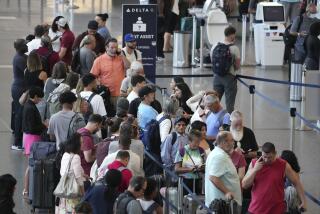UAL Loss Biggest in Airline History
- Share via
United Airlines parent UAL Corp. posted a massive fourth-quarter loss that, although smaller than Wall Street expected, still left UAL with a net loss of $2.1 billion for 2001--the worst showing in airline history.
As the last major carrier to post its results, UAL put an exclamation point on the industry’s disastrous 2001, when the carriers were hit with an economic recession and the unprecedented drop in air travel after the Sept. 11 terrorist attacks. The major airlines combined lost more than $7 billion last year.
In the fourth quarter, UAL lost $640 million, or $11.74 a share, after excluding one-time gains and charges, including its portion of the federal bailout aid. That was considerably better than the $14.96-a-share loss forecast by Wall Street, according to analysts surveyed by Thomson Financial/First Call.
But United, the nation’s second-largest carrier behind AMR Corp.’s American, remains in deep trouble. Based in Elk Grove Township, Ill., United is a leading carrier for business passengers and thus is being particularly hurt by the slump in business travel. The airline said it expects another significant loss in the current quarter.
Airline executives said that United is losing about $10 million a day, but that it also has about $2.6 billion in cash. “We think we have enough time to implement the recovery plan,” said Frederic Brace, UAL’s chief financial officer.
That plan includes trying to secure huge savings from United’s employees, who own a majority of UAL’s stock and account for nearly 40% of United’s costs. Brace said that the airline was seeking several billion dollars in labor-cost reductions via negotiations with the workers’ unions, but that the effort is being slowed by United’s dispute with its mechanics.
The 15,000 mechanics, represented by the International Assn. of Machinists, will vote this month on a contract proposed by a presidential board, which was appointed to block a mechanics strike while it tries to broker a settlement. Its proposal carries sizable pay hikes, and the mechanics have indicated they won’t entertain any concessions until the higher wage scales are in place.
UAL President Rono Dutta, in a call with analysts Friday, acknowledged that the dispute also is affecting the airline’s bookings. “Our labor uncertainty has caused some loss of traffic,” he said.
Still, United said that its overall passenger traffic has been improving every quarter since Sept. 11 and that it plans to restore 127 flights in April. Immediately after the terrorist strikes, which involved two of its jetliners, United slashed about 20% of its operations to roughly 1,650 flights a day.
But investors Friday found little to like in UAL’s results. The airline’s stock tumbled $1.27 a share, or 8%, to $13.43 on the New York Stock Exchange.
UAL’s net loss in the fourth quarter, after including the government aid and other one-time items, was $308 million, or $5.68 a share, and its $2.1-billion net loss for the year equaled $40.04 a share. UAL’s annual revenue tumbled 17% to $16.1 billion from $19.4 billion.
The prior record for an annual loss was in 1990, when Continental Airlines lost $1.23 billion, according to New Haven, Conn.-based consulting firm Back Aviation Solutions.Two other carriers broke that record last year: US Airways lost $1.97 billion and AMR lost $1.8 billion.
More to Read
Inside the business of entertainment
The Wide Shot brings you news, analysis and insights on everything from streaming wars to production — and what it all means for the future.
You may occasionally receive promotional content from the Los Angeles Times.











